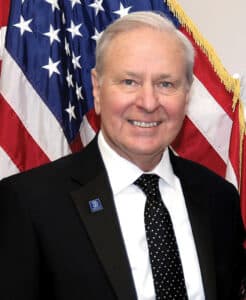On Leadership: DMACC president, Iowa Hall of Famer Robert J. Denson on Transformational Leadership

Business Record Staff Jul 19, 2024 | 6:00 am
4 min read time
1,033 wordsAll Latest News, On Leadership, OpinionThis is part of an ongoing series on Transformational Leadership.

When Robert J. Denson marked his 20th anniversary as president of Des Moines Area Community College (DMACC) in December of 2023, he was quoted as saying: “I’m as excited and energized to be in this role today as I was my first day on the job.”
That passion for service is just one of many reasons that Denson, who was recently inducted into the Iowa Business Hall of Fame and is DMACC’s longest-serving president, can be described as a Transformational Leader. Denson’s dedication, track record of success and commitment to developing and nurturing others make him a role model to anyone aspiring to truly make a difference in their career.
Denson grew up on a farm near Homestead, Iowa, and was the first native-born Iowan to serve as DMACC’s president. He earned a B.S. in political science and economics and a master’s degree in higher education administration from Iowa State University, where he worked as an assistant dean for three years before moving to the University of Florida to be an assistant dean of students. He subsequently graduated from law school at the University of Florida and embarked on a career in law, but after 19 years in that field, pivoted back to higher education. After working at Santa Fe College in Gainesville, Fla., he returned to Iowa, first serving as president of Northeast Iowa Community College in Calmar and Dubuque and ultimately joining DMACC.
Under Denson’s leadership, DMACC has become one of America’s top-rated two-year academic institutions. Denson’s vision to focus on quality faculty, staff, administration and instruction, keeping tuition low and developing public-and-private partnerships, has fueled DMACC’s enrollment by more than 50% since he started in 2003. The institution now offers over 220 programs, certificates and transfer degrees, serving nearly 60,000 credit and noncredit students each year.
Denson, now 77, is active on the boards of various community organizations, including the governor’s STEM Advisory Council and Executive Committee and on the boards of Iowa Student Loan Liquidity, Future Ready Iowa, the Agribusiness Association of Iowa, the Iowa Direct Caregivers Council the Iowa Rural Development Council, the Greater Des Moines Partnership, the Iowa Innovation Council, the Iowa Economic Development Authority, the Shazam board and others.
Given his success and unwavering support of the community and of others, I asked Denson to share some of his thoughts and reflections on Transformational Leadership:
Who was someone you worked with who was a transformational leader?
This is the easiest question to answer: Art Sandeen, Ph.D., from 1970 to 1974 while he was dean of students at Iowa State University, and from 1974 to 1982 as vice president for student affairs at the University of Florida. I worked for Art during these years as a young professional, and he continued to be a mentor for several more years as I went on to other positions. He inspired me and several future college presidents and other successful professionals, both in and out of education. His foundational guidance for an aspiring leader was work ethic, responsiveness, and all about outcomes. As former DMACC President Joe Borgen frequently said: “Don’t confuse effort with outcome.”
What are some themes or key characteristics of Transformational Leaders?
In summary, key characteristics of Transformational Leaders are being “personally invested,” “all in,” and “always showing up” for their organization, community and family. Also, and as a natural consequence, being a supportive guide for others in and outside the organization as to the personal and professional excitement and accomplishment that comes with striving beyond the required expectations of any role or job, from entry through executive level. Such leaders I have respected and observed had little or no ego. They looked for opportunities to give others opportunities. They paid attention to details and did, by their actions, always strive to make their organizations better. It’s the outcome that defines the transformation, even having to make the tough decisions that make the difference. Transformational Leaders must surround themselves with trusted key team members who bring their own passion for accomplishment. Listen to their input.
How have you worked to transform your organization?
In the final analysis, at any point in time, we must ask: “Has the organization, relationship or issue at hand been transformed?” I believe most good leaders never say: “What did I do?” but ask themselves, “Am I doing enough?” This is the question that haunts my daily thoughts. I love the challenge of helping people and organizations get to their “next level” and then define and fulfill the mission.
In my 21 years at DMACC, it’s been about growth and service – and we did. It’s been about increased community engagement – and we did. It’s been about increasing business relationships – and we did. It’s been about being a better partner in all sectors – and we are. We have tried to be more engaged with governmental leaders and advocacy – and we are. We’ve looked for efficiencies using data and making tough decisions in a hypercompetitive environment – and we are doing so. We are continually looking for opportunities – and we will find them.
In looking at your career, how or when do you wish you might have approached leadership differently?
I wish I had understood earlier the value and role of “unanswered prayers,” those things I thought at the time to be so critical and important but didn’t happen and sparked sadness and personal disappointment. But, they nearly always lead to other and better opportunities that would not have been possible had the original outcome been different. In 1994, I ran for the Florida House of Representatives. I campaigned hard for three years and lost by 460 votes out of the 41,166 votes cast. It was a major disappointment. However, had it not happened as it did, I would very likely not be where I am today, professionally fulfilled, happily married to Pat for 54 years, and completely happy to be back in Iowa! Thank God for unanswered prayers – a great life lesson that all should learn. So, in leadership or in life, know and appreciate the value of not always getting what you want.










